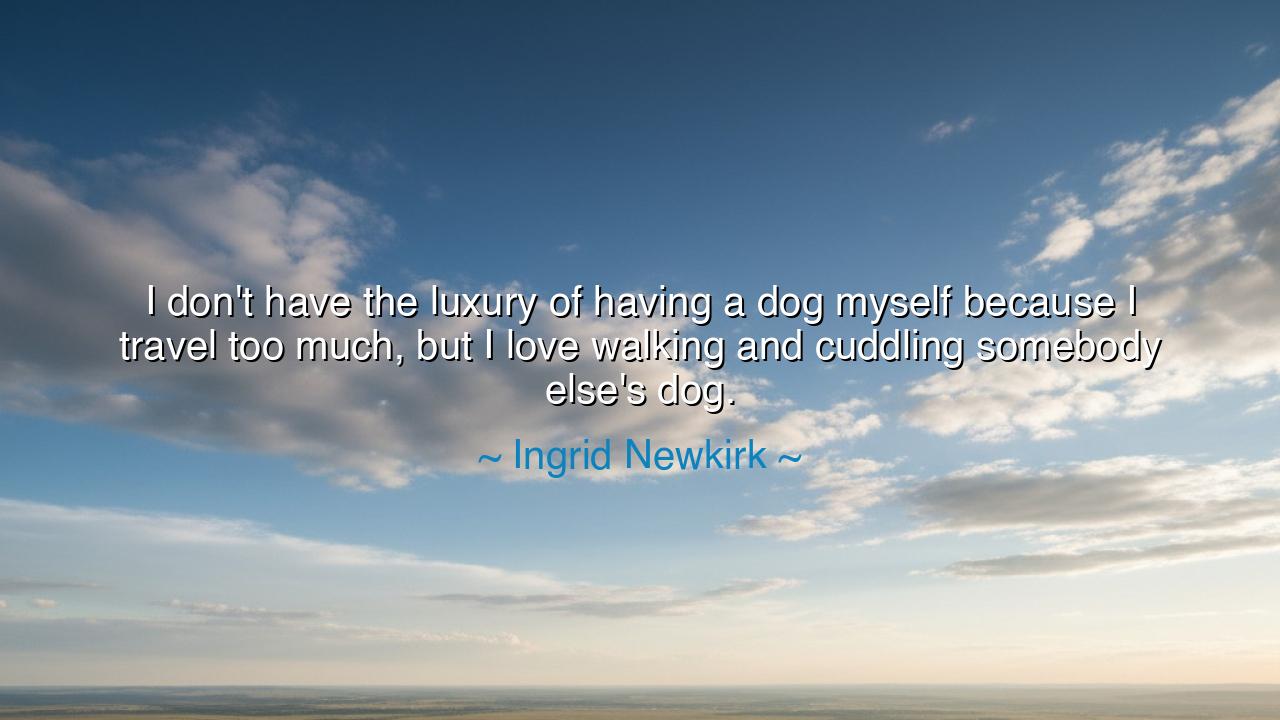
I don't have the luxury of having a dog myself because I travel
I don't have the luxury of having a dog myself because I travel too much, but I love walking and cuddling somebody else's dog.






When Ingrid Newkirk confessed, “I don’t have the luxury of having a dog myself because I travel too much, but I love walking and cuddling somebody else’s dog,” she spoke with a tenderness that reveals the balance between desire and responsibility, between love for creatures and the demands of duty. Her words, though humble, reflect the eternal struggle of the human heart: we long to give ourselves fully, yet life’s path often pulls us in directions where sacrifice is required.
The dog, since the dawn of civilization, has been humanity’s most faithful companion—guardian, friend, and mirror of loyalty. To live with such a being is a blessing, yet it is also a responsibility, for the dog depends on the constancy of its master. Newkirk, whose life is filled with constant travel, admits she cannot grant this stability. Her choice not to take a dog, though painful, is in truth an act of love, for she would not bind an animal to a life of neglect or loneliness. Thus, what may seem like deprivation is in fact respect for the bond between human and beast.
And yet, she finds joy in the companionship of “somebody else’s dog.” This, too, holds wisdom. It is a reminder that one need not possess in order to love, nor own in order to delight. The ancients taught that all creatures belong first to the earth and the heavens, not to us. By cherishing a neighbor’s animal, by walking and cuddling without the claim of possession, Newkirk embodies the truth that affection is a gift we give freely, not a right we demand.
History has known figures who lived with similar sacrifices. Consider Saint Francis of Assisi, who wandered in poverty and had no permanent companions, yet loved all creatures as brothers and sisters. Birds alighted upon him, wolves obeyed his voice, and yet he never claimed them as his own. His heart was so wide that ownership was unnecessary; love was enough. So too with Newkirk, whose affection for animals transcends possession, becoming instead a shared joy, a recognition of kinship beyond ownership.
There is also a deeper lesson here about luxury. To many, having a dog seems simple. But in truth, it is a blessing of time, stability, and presence. Newkirk reminds us that love demands responsibility, and that to accept responsibility without the means to honor it is to betray love itself. Better to forgo the luxury than to dishonor the bond. In this restraint, she shows the strength of true compassion—the willingness to deny oneself for the sake of another’s well-being.
So, dear listener, the lesson is this: love is not always possession, and responsibility must guide desire. Do not take into your care that which you cannot nurture, no matter how deeply you yearn for it. Yet do not despair, for love can still be expressed in small ways—in the borrowed joy of another’s dog, in the fleeting companionship of a creature met upon the road, in kindness given without ownership. Love is not measured by possession, but by the tenderness of the act.
In practical action, this means: if your life does not allow for permanent care, seek ways to share in love temporarily—offer to walk a neighbor’s dog, visit an animal shelter, or give time to creatures in need. Live not with the hunger to own, but with the freedom to give. In this way, your heart remains open, your spirit remains generous, and the world receives your love without chains.
Thus the words of Ingrid Newkirk remind us of a truth as old as humanity itself: that love, when it is real, does not demand ownership. To cuddle another’s dog, to share in its joy, to respect its needs above one’s own—that is love in its purest form. And in learning this, we discover that life’s truest blessings lie not in what we possess, but in how we care.






AAdministratorAdministrator
Welcome, honored guests. Please leave a comment, we will respond soon